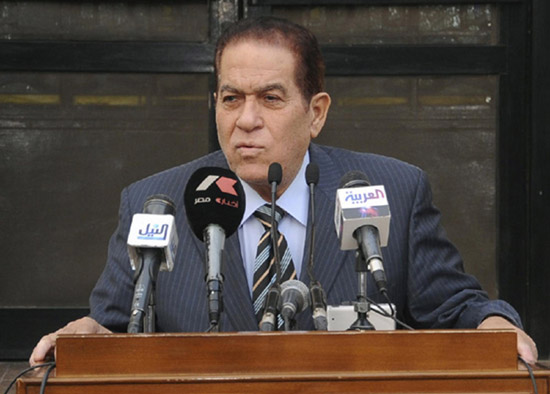Egypt's military names new PM
Updated: 2011-11-26 08:52
(Xinhua)
|
|||||||||||
 |
|
Egyptian new Prime Minister Kamal Ganzouri speaks at a news conference at the Defense Ministry in Cairo November 25, 2011. [Photo/Agencies] |
CAIRO - Egypt's military ruler on Friday officially appointed Kamal al-Ganzouri, a former prime minister, as the head of a national salvation government.
Head of the Supreme Council of the Armed Forces (SCAF) Field Marshal Hussein Tantawi issued a decree on Friday about the appointment, and also granted al-Ganzouri all powers that enable him to perform his duty properly.
Al-Ganzouri later told a press conference that a new cabinet will not be formed before the country's parliamentary elections which kick off on November 28.
"I asked for some time to name the ministers of the new government, which will surely not be formed before the polls take place on Monday. But it will not take long," he said.
The military has given him much more power than the previous prime ministers, al-Ganzouri said, adding that he has full power to form a national salvation government.
He also said that Tantawi is not planning to stay in power. Otherwise, he would not accept the mission, he said.
The newly appointed leader stressed that he accepted the post to serve the country and that the formation of a new cabinet depends on the extent to which people's desired goals will be achieved. Yet, he also admitted that the premiership was rather challenging.
On Friday, a military source told Xinhua that al-Ganzouri had started consultations about the new cabinet formation with the military rulers, the caretaker cabinet members of Essam Sharaf, who had served as the prime minister since March but resigned lately under pressure from protesters, and some new candidates.
The source revealed that the interior and information ministers were most likely to be first changed.
Born in 1933, al-Ganzouri graduated from the agricultural department in Cairo University, and later studied in the United States and got a doctor's degree in economics. Since 1981, he took such posts as governors, minister of planning and deputy prime minister.
He led the Egyptian government under the Mubarak rule from January of 1996 to October of 1999, and was one of the key designers of the economic reforms which started in 1991.
The appointment of al-Ganzouri met with different reactions from political parties in the country.
Parties like the Conservative Party and the New Independent Party expressed support for al-Ganzouri. But the National Association of Change, the Wasat Party, the April 6 movement and the Revolution Youth Coalition and the Islamic Group are opposed to the military's decision -- they proposed Mohamed ElBaradei, former chief of the IAEA and a potential presidential candidate, be the prime minister.
Meanwhile, on Friday in the Abbasseya Square, thousands of people gathered to show support for the military council. "The people and the army are one hand," chanted some supporters, who called for holding the elections on time and asked SCAF not to transfer power until the elections of a civilian government.
"We are Egyptians. We need stability and survival. We have lost a lot of money in stocks. We want security, which could only be guaranteed by the armed forces," a protester said.
Amr Moussa, former chief of the Arab League and also a potential presidential candidate, called on youth activists to participate in the government formation.
The ruling military council said on Friday it decided to extend the first round and run-off voting from one to two days in each of the three stages, state TV said.
According to the High Judicial Elections Commission, the move was to increase the turnout.
The military council has met unprecedented opposition from protestors after it took over power on February 11 when President Hosni Mubarak resigned amid 18 days of anti-government protests.
Since November 18, mass protests erupted again in the Egyptian capital of Cairo and some other major cities, demanding the resignation of Sharaf's cabinet and the quicker transfer of power to a civilian rule. Clashes during the protests have by now left 41 dead and more than 3,000 injured, official figures showed.
Hot Topics
HIV/AIDS, Egypt protest, Thanksgiving, climate change, global economic recovery, home prices, high-speed railways, school bus safety, Libya situation, Weekly photos
Editor's Picks

|

|

|

|

|

|







